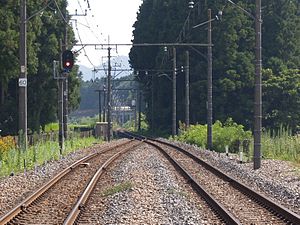Tobu Kinugawa Line
| Tobu Kinugawa Line | |
|---|---|
| TN | |
 | |
| Overview | |
| Owner | Tobu Railway |
| Locale | Tochigi Prefecture |
| Termini | |
| Service | |
| Type | Heavy rail |
| Technical | |
| Line length | 16.2 km (10.1 mi) |
| Track gauge | 1,067 mm (3 ft 6 in) |
The Tobu Kinugawa Line (東武鬼怒川線, Tōbu Kinugawa-sen) is a 16.2 km long Japanese railway line from Shimo-Imaichi Station to Shin-Fujiwara Station in Nikkō, Tochigi. It is owned and operated by the private railway operator Tobu Railway.[1]
At Shimo-Imaichi Station it connects with the Tobu Nikko Line. At Shin-Fujiwara Station it connects with the Yagan Railway Aizu Kinugawa Line. Some trains goes beyond the Aizu Kinugawa Line terminus at Aizu-Kōgen Oze-guchi Station onto the Aizu Railway Aizu Line.
The line runs surcharged, reserved-seat limited express services from and to Asakusa and Shinjuku in Tokyo.
The whole line is electrified at 1,500 V DC, but it is single tracked except for a 0.8 km double-tracked section at Kinugawa-Onsen Station.
Stations
| No. | Station | Japanese | Distance (km) | Transfers | Location | |
|---|---|---|---|---|---|---|
| Between stations |
Total | |||||
| TN-23 | Shimo-Imaichi | 下今市 | - | 0.0 | Tobu Nikko Line | Nikkō, Tochigi |
| TN-51 | Daiya-Mukō | 大谷向 | 0.8 | 0.8 | ||
| TN-52 | Ōkuwa | 大桑 | 4.0 | 4.8 | ||
| TN-53 | Shin-Takatoku | 新高徳 | 2.5 | 7.3 | ||
| TN-54 | Kosagoe | 小佐越 | 2.6 | 9.9 | ||
| TN-55 | Tobu World Square | 東武ワールドスクウェア | 0.7 | 10.6 | ||
| TN-56 | Kinugawa-Onsen | 鬼怒川温泉 | 1.8 | 12.4 | ||
| TN-57 | Kinugawa-Kōen | 鬼怒川公園 | 2.1 | 14.5 | ||
| TN-58 | Shin-Fujiwara | 新藤原 | 1.7 | 16.2 | Yagan Railway Aizu Kinugawa Line | |

History
- 1915: Fujiwara Tramway (藤原軌道株式会社, Fujiwara Kidō Kabushiki-gaisha) was licensed to build a 762 mm (2 ft 6 in) gauge steam-hauled tramway. It was renamed Shimotsuke Tramway (下野軌道株式会社, Shimotsuke Kidō Kabushiki-gaisha) in the same year.
- 2 January 1917: A 3.6-mile (5.8 km) section from Daiya-gawa Hokugan Station to Kinugawa Nangan Station was opened. The line was extended a further 2.5 miles (4.0 km) the same year.
- March 1919: Ōhara Station to Shimotaki Station section was opened.
- October 1919: Daiya Mukō Imaichi Station to Shin-Imaichi Station section was opened.
- 1 January 1920: Shimotaki Station to Fujiwara Station section was open to complete the whole 10.9-mile (17.5 km) line.
- 6 June 1921: The company name was renamed Shimotsuke Electric Railway Co., Ltd. (下野電気鉄道株式会社, Shimotsuke Denki Tetsudō Kabushiki-gaisha).
- 9 March 1922: The whole line was electrified at 600 V DC.
- April 1927: The corporate headquarters was relocated to the Tobu Railway headquarters in Tokyo.
- 22 October 1929: 1,067 mm (3 ft 6 in) gauge operation began on all the line.
- 1931: The voltage was raised to 1,500 V.
- 1 May 1943: Shimotsuke Electric Railway was bought out by Tobu Railway. The line became Tobu Kinugawa Line.
- 9 October 1986: Yagan Railway Aizu Kinugawa Line through service began.
- 12 October 1990: Aizu Railway Aizu Line through service to Aizu Tajima Station began.
- 18 March 2006: New Kinugawa services to/from Shinjuku commence.[2]
From 17 March 2012, station numbering was introduced on all Tobu lines, with Tobu Kinugawa Line stations adopting the prefix "TN" in orange.[3]
A new station, called Tobu World Square Station, opened between Kosagoe and Kinugawa-Onsen on 22 July 2017 to serve the nearby Tobu World Square theme park.[4] From this date, Tobu World Square Station was numbered "TN-55", and the station numbers for Kinugawa-Onsen to Shin-Fujiwara were adjusted on 21 April 2017, ahead of the opening.[4]
Future developments
Steam-hauled services

Tobu has borrowed former JNR Class C11 steam locomotive C11 207 from JR Hokkaido for use on the 12.4 km section of the Kinugawa Line between Shimo-Imaichi and Kinugawa-Onsen stations from 10 August 2017.[5] Turntables will also be installed at Shimo-Imaichi and Kinugawa-Onsen to turn the locomotive in service.[5] A two-stall engine shed is also being constructed for the steam loco at Shimo-Imaichi.
See also
References
- ^ Terada, Hirokazu (July 2002). データブック日本の私鉄. Japan: Neko Publishing. p. 199. ISBN 4-87366-874-3.
{{cite book}}: Unknown parameter|trans_title=ignored (|trans-title=suggested) (help) - ^ JR新幹線&特急列車ファイル. Japan: Kōtsū Shimbun. 2008. p. 76. ISBN 978-4-330-00608-6.
{{cite book}}: Unknown parameter|trans_title=ignored (|trans-title=suggested) (help) - ^ 「東武スカイツリーライン」誕生! あわせて駅ナンバリングを導入し、よりわかりやすくご案内します (pdf). Tobu News (in Japanese). Tobu Railway. 9 February 2012. Retrieved 26 May 2015.
{{cite web}}: Unknown parameter|trans_title=ignored (|trans-title=suggested) (help) - ^ a b 東武鬼怒川線新駅「東武ワールドスクウェア」の開業日を7月22日(土)に決定しました! (PDF). News release (in Japanese). Japan: Tobu Railway. 28 February 2017. Archived from the original (pdf) on 1 March 2017. Retrieved 1 March 2017.
{{cite web}}: Unknown parameter|dead-url=ignored (|url-status=suggested) (help); Unknown parameter|trans_title=ignored (|trans-title=suggested) (help) - ^ a b 東武鬼怒川線で復活するSL「大樹」の営業運転開始日を2017年8月10日(木)に決定! (PDF). News release (in Japanese). Japan: Tobu Railway. 18 January 2017. Archived from the original (pdf) on 19 January 2017. Retrieved 19 January 2017.
{{cite web}}: Unknown parameter|trans_title=ignored (|trans-title=suggested) (help)
